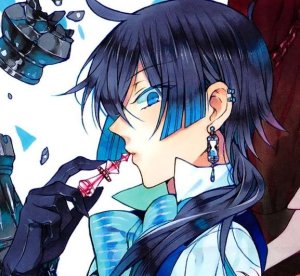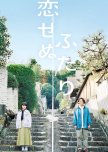I debated whether or not to write this review, because I think that it's been a while and, at this point, it may not matter, but I would be betraying myself if I didn't sing the praises this drama deserves.
When I heard that Erika Yoshida, who had written one of my favorite aroace characters of all time (Nozomi Fujisaki in Cherry Magic) was writing a whole drama with two aroace leads, I was looking forward to it immensely. After actually watching it, this drama did not disappoint in the least.
It's difficult to find aromantic, asexual or aroace representation in media. It's even more difficult to find good representation. Furthermore, fanon never helps with it, given that it's more often to see characters that could be interpreted as aroace in canon shipped in fanon, as if it was always, unequivocally, a "problem to fix".
This drama doesn't give you one, it gives you two aroace characters who, upon talking about their experiences, decide to live together and figure out if a family born from a love that isn't romantic can withstand just as strongly, whether society around them likes it or not, understands it or not, sees it for what it is or not.
Having two characters that are so diametrically opposed in personality (Sakuko is easygoing, charismatic, doubtful and insecure; Satoru is introverted, quiet, confident and passionate about what he loves to do) and who experience their aroace-ness in different ways, coming from different histories with relationships, makes it incredibly rewarding and allows to portray their identities not as a set, unmovable label, but as complex experiences on a spectrum.
A very pleasant surprise for me was Kazu, a character I thought was going to become too pushy with his amatonormativity, but he became a great asset to not only showcase how people can adapt to understanding others but also, probably, allow those who don't know about the aroace experience to have someone to learn with.
The story isn't a thrilling, action-packed one. This is one of the domestic, day-to-day, cozy ones. Both Satoru and Sakuko deal with work, their life aspirations, societal expectations, family and friends; but the seriousness with which the drama takes the subject and the way in which it centers itself in the portrayal of aroace experiences, makes it more emotionally vulnerable than other domestic dramas, especially if you identify. Honestly, I wish this drama was more easily available with different language subtitles so I could watch it with people who may not understand. I think it'd be a fantastic way to help those around learn about things that I wish they understood.
If you're anywhere in the asexual, aromantic or aroace spectrum, do yourself a favor and look for this drama. There is little else out there that does such a good job and has such respect towards the subject. I can only hope Erika Yoshida continues to give us this rep, because she is great at it.
When I heard that Erika Yoshida, who had written one of my favorite aroace characters of all time (Nozomi Fujisaki in Cherry Magic) was writing a whole drama with two aroace leads, I was looking forward to it immensely. After actually watching it, this drama did not disappoint in the least.
It's difficult to find aromantic, asexual or aroace representation in media. It's even more difficult to find good representation. Furthermore, fanon never helps with it, given that it's more often to see characters that could be interpreted as aroace in canon shipped in fanon, as if it was always, unequivocally, a "problem to fix".
This drama doesn't give you one, it gives you two aroace characters who, upon talking about their experiences, decide to live together and figure out if a family born from a love that isn't romantic can withstand just as strongly, whether society around them likes it or not, understands it or not, sees it for what it is or not.
Having two characters that are so diametrically opposed in personality (Sakuko is easygoing, charismatic, doubtful and insecure; Satoru is introverted, quiet, confident and passionate about what he loves to do) and who experience their aroace-ness in different ways, coming from different histories with relationships, makes it incredibly rewarding and allows to portray their identities not as a set, unmovable label, but as complex experiences on a spectrum.
A very pleasant surprise for me was Kazu, a character I thought was going to become too pushy with his amatonormativity, but he became a great asset to not only showcase how people can adapt to understanding others but also, probably, allow those who don't know about the aroace experience to have someone to learn with.
The story isn't a thrilling, action-packed one. This is one of the domestic, day-to-day, cozy ones. Both Satoru and Sakuko deal with work, their life aspirations, societal expectations, family and friends; but the seriousness with which the drama takes the subject and the way in which it centers itself in the portrayal of aroace experiences, makes it more emotionally vulnerable than other domestic dramas, especially if you identify. Honestly, I wish this drama was more easily available with different language subtitles so I could watch it with people who may not understand. I think it'd be a fantastic way to help those around learn about things that I wish they understood.
If you're anywhere in the asexual, aromantic or aroace spectrum, do yourself a favor and look for this drama. There is little else out there that does such a good job and has such respect towards the subject. I can only hope Erika Yoshida continues to give us this rep, because she is great at it.
Esta resenha foi útil para você?





















